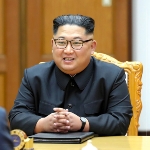Background
Kim Il-sung was born as Kim Sŏng-ju on April 15, 1912 in Mangyongdae, Pyongyang, North Korea. He was a son of Kim Hyong Jik and Kang Ban Sok. His family moved to Chinese-controlled Manchuria in 1919 to escape the harsh Japanese rule.

1926
Kim Il-sung
1953
Kim Il-sung speaking.
1953
Kim Il-sung
1958
Kim Il-sung begins the evacuation of Chinese troops from North Korea.
1958
Prime Minister Kim Il-sung of Communist North Korea and Chinese Premier Zhou Enlai wave to crowds after arriving in Beijing on a state visit.
1966
North Korean Premier, Kim ll-sung at a rally in Pyongyang.
1975
Kim Il-sung stands underneath his own portrait at a ceremonial rally marking the anniversary of the Korean Labour Party.
1975
North Korean Communist dictator, Kim Il-sung, at a party cultural performance.
1975
Kim Il-sung visiting the border guards of North Korea.
1984
General Secretary of the Workers' Party of Korea, President of the Democratic People's Republic of Korea Kim Il-sung and the Korean governmental delegation visit the Krasnoyarsk hydropower station.
1984
The President of the Korean Democratic People's Republic of Korea, Kim Il-sung in Dresden during an official visit.
1984
Kim Il-sung visits Krasnoyarsk.
1987
Kim Il-sung
1988
North Korean Leader Kim Il-sung.
Korean leader Kim Il-sung arrives at Schönefeld Airport in East Berlin, and is welcomed by Otto Grotewohl, Prime Minister of the German Democratic Republic (East Germany), 6th June 1956.
The Prime Minister of North Korea, Kim Il-sung, accompanied by a Governmental Delegation from the Democratic People'S Republic giving a speech before a Beijing audience which greeted him at Beijing's gymnasium, on November 24, 1958.
Mosaic of Kim Il-sung in Pyongyang, North Korea on May 19, 2009.
The president of North Korea, Kim Il-sung walks in front of a military line at the funeral of the Marshal Tito. Belgrade, 8th May 1980.
Premiere Kim Il-sung of North Korea is pictured during a reception given for Russian women, which included members of the Commission of the Women's International Democratic Federation, investigating alleged atrocities in Korea.
Kim Il-sung with his son Kim Jong-il on a building site.
North Korean leader Kim Il-sung with Polish prime minister Wojciech Jaruzelski in Warsaw, Poland, May 1984.
North Korean leader Kim Il-sung and his son Kim Jong-il talk with Chinese politician Song Ping ahead of the Workers' Party of Korea 45th Anniversary of its foundation ceremony at the February 8 House of Culture on October 9, 1990 in Pyongyang, North Korea.
The official visit of North Korean leader Kim Il-sung in Warsaw, Poland, May 1984.
Chinese leader Deng Xiaoping in conversation with Kim Il-sung, the leader of North Korea, during a visit to North Korea, September 1978.
Liu Shao-chi, Chairman of the People's Republic of China and Vice-chairman of the Central Committee of the Communist Party of China, being greeted at the railway station in Pyongyang by Premier Kim Il-sung and President Choi Yong Kun of Korea. September 15, 1963.
Chinese Premier Chou En-lai meeting with North Korean Premier Kim Il-sung during the visit of the Korean Government Delegation on November 22, 1958.
Zhou En Lai, the Minister of Foreign Affairs for the People's Republic Of China accompanying Kim Il-sung, the Prime Minister of the Democratic People's Republic of North Korea, then on official visit in Beijing, on November 14, 1953.
North Korean leader Kim Il-sung shakes hands with ruling Liberal Democratic Party lawmaker Ichiro Ozawa prior to the Workers' Party of Korea 45th Anniversary of its foundation ceremony at the Kumsusan Palace on October 10, 1990 in Pyongyang, North Korea.
The Prime Minister of the Democratic People's Republic of North Korea, Kim Il-sung leaving Beijing's airport with the President of the People's Republic of China, Liu Shao-Chi on July 10, 1961.
François Mitterrand and Kim Il-sung in July 1986, North Korea.
Kim Il-sung statue on Mansudae Hill, Pyongyang.
Propaganda poster with Kim Il-sung when he was a young officer in the army during the Korean war, South Pyongan Province, Chongsan-ri Cooperative Farm, North Korea.
Kim Il-sung recording a radio speech, June 1950
The Medal of the Hero of the Republic that Kim Il-sung received three times.
The Medal of the Hero of Labor that Kim Il-sung received in 1958.
The Order of the National Flag, 1st Class, that Kim Il-sung received in 1951 and 1953.
The Order of Freedom and Independence that Kim Il-sung received in 1952.
The Order of Lenin that Kim Il-sung received in 1972 and 1987.
The Order of the Yugoslav Star that Kim Il-sung received in 1977.
The Order of Karl Marx that Kim Il-sung was awarded in 1982.
The Order of Klement Gottwald that Kim Il-sung was awarded in 1987.
Songjiang W Rd, Chuanying District, Jilin City, Jilin, China
Jilin Yuwen High School where Kim Il-sung studied.
Kim Il-sung (back row, center) with his squad fighters.
Mangyongdae, Pyongyang, North Korea
The house where Kim Il-sung was born.
Kim Il-sung (centre) and Kim Tu-bong (second from right) at the joint meeting of the New People's Party and the Workers' Party of North Korea in Pyongyang, 28 August 1946
Kim on a 1956 visit to East Germany, chatting with painter Otto Nagel and Prime Minister Otto Grotewohl.
Kim Il-sung's 80th birthday ceremony with international guests, April 1992.
































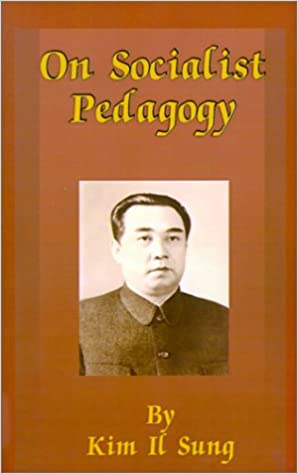
(This book contains speeches and writings of North Korean ...)
This book contains speeches and writings of North Korean leader Kim Il Sung on the subject of raising and teaching children. His thoughts offer interesting insights into the communist philosophy of education, at least as practiced in North Korea.
https://www.amazon.com/Socialist-Pedagogy-Kim-Sung/dp/0898756464
1979
Kim Il-sung was born as Kim Sŏng-ju on April 15, 1912 in Mangyongdae, Pyongyang, North Korea. He was a son of Kim Hyong Jik and Kang Ban Sok. His family moved to Chinese-controlled Manchuria in 1919 to escape the harsh Japanese rule.
Kim Il-sung attended Whasung Military Academy in 1926, but he quit it in 1927. He also studied at Jilin Yuwen High School from 1927 to 1930.
As a student Kim Il-sung joined the Chinese Communist Youth League. He was arrested and jailed for his activities with the group in 1929. After his release from prison, Kim began leading small Chinese guerrilla forces on raids against remote Japanese outposts in northern Korea along the Manchurian border. In 1935, Kim became a member of the Northeast Anti-Japanese United Army, a guerrilla group led by the Communist Party of China. He was appointed the same year to serve as political commissar for the 3rd detachment of the second division, consisting of around 160 soldiers. In 1937, Kim was appointed commander of the 6th division controlling a few hundred men in a group that came to be known as "Kim Il-sung's division". While commanding this division, he executed a raid on Poch’onbo, on 4 June 1937. By 1939, the Japanese forces had gained the upper hand, and Kim fled from Manchuria to the far eastern part of Siberia in the Soviet Union. The Soviets gave Kim military and political training in Khabarovsk. Kim Il-sung became a Major in the Soviet Red Army and served in it until the end of World War II in 1945.
After World War II Kim returned with other Soviet-trained Koreans to establish a communist provisional government under Soviet auspices in what would become North Korea. He became the First Premier of the newly formed Democratic People’s Republic of Korea in 1948, and in 1949 he became chairman of the Workers' Party of North Korea. One of his first acts as Premier was to convince his Soviet military supporters that he could sweep across the 38th parallel, conquer South Korea in three weeks, and re-unify the country. In 1950 Kim became the Supreme Commander of Korean People's Army and in June of the same year North Korean forces swept into South Korea. Within only three days, he had captured Seoul and pushed South Korean forces southward down the peninsula. His attempt to extend his rule there was repelled by the United States troops and other forces of the United Nations, however, and it was only through massive Chinese support that he was able to repel a subsequent invasion of North Korea by UN forces. The Korean War ended in a stalemate in 1953.
The war left North Korea's economy in shambles. Kim focused on rebuilding the economy and firming up his control. He closed North Korea to most outside contacts and purged all his internal enemies. No foreign newspapers were allowed, and radios could only receive state-owned stations. In 1955, Kim Il-sung promoted a doctrine of national self-sufficiency, known as Juche, and proclaimed himself the absolute ruler and leader of the North Korean people. He also wrote books, treatises, and essays devoted to Juche ideology. To build North Korea's international standing, Kim successfully established ties with Third World countries. In all, Kim established diplomatic relations with over 130 nations. North Korea became a major arms supplier to governments and revolutionaries in Africa, Asia, and Latin America. In the 1980s, Kim supplied Iran with weapons during Iran's war with Iraq. He also provided arms to Libya and Syria.
By the 1970s, North Korea's military spending reached 25 percent of the national budget and was undermining the nation's economy. Much of the budget also went to constructing grand monuments to honor Kim. Statues of Kim sprang up everywhere. While retaining control of the Korean Workers’ Party, Kim relinquished the office of premier and was elected president of North Korea in December 1972. In the same year he became the Chairman of the State Affairs Commission and ordered a new constitution to take effect, making him the permanent president of the country. Prior to this, Kim had been an unelected leader. In 1991, Kim Il-sung successfully lobbied the United Nations to admit his country as a member nation. In the same year, he appointed his son as head of the military, whom he had named his successor. In 1992, he negotiated a series of compromises with South Korea. These included a non-aggression pact and economic exchange. However, a year later, he reversed his earlier position and North Korea cut off all official contact with South Korea. In 1994, Kim began a program of nuclear power development. He also ordered that work begin on developing a ballistic nuclear missile. Kim Il-sung died on July 8, 1994 shortly before a scheduled summit with the president of South Korea.
Kim Il-Sung was a North Korean politician, known as the Eternal President of North Korea and the founder and first Supreme Leader of North Korea, which he ruled from the country's establishment in 1948 until his death in 1994. Under his leadership, North Korea was established as a communist state with a publicly owned and planned economy. He is also known as the third longest-serving non-royal head of state in the 20th century.
Kim Il-Sung developed the Juche Idea, an ideology that stresses the need of self-reliance and which is central to North Korea's official line of thought. There are over 500 statues of Kim Il-sung in North Korea. The football stadium in Pyongyang, the main North Korean University, the square in the center of Pyongyang, many streets in North Korean were named after Kim Il-sung. His birthday is celebrated every year as a public holiday in North Korea and known as "Day of the Sun".
According to North Korean sources, Kim Il-sung had received 230 foreign orders, medals and titles from 70 countries since the 1940s until, and after, his death. He received the Medal of the Hero of the Republic three times. He also was awarded the Medal of the Hero of Labor and the Order of the National Flag. In 1952 he received the Order of Freedom and Independence. Kim Il-sung also received the Order of Lenin and the Order of the Yugoslav Star and the Order of Klement Gottwald.
(This book contains speeches and writings between 1948 and...)
1973(This book contains speeches and writings of North Korean ...)
1979(With the Century is the autobiography of Kim Il-sung, fou...)
1992(Contains works and essays written by Kim Il Sung.)
2011Kim Il-sung criticized religion in his writings, and North Korean propaganda in literature, movies and other media have presented religion in a negative light. Kim Il-sung's attack on religion was strongly based on the idea that religion had been used as a tool for imperialists in the Korean peninsula. He criticized Christians for collaborating with the United Nations' forces against him during the Korean War, although he praised Christians who supported him.
Kim Il-sung was a member of the Communist Party of China from 1931 to 1946. In 1946 he joined the Workers' Party of North Korea and became its chairman in 1949. Later he developed and propagated a doctrine of nationalist self-sufficiency, known as Juche. It was Kim's attempt to apply the ideas behind German philosopher Karl Marx's communism to the unique Korean society. Kim Il-sung said that independence in politics is the first sign of sovereignty. In order to establish political independence, it is necessary to establish people's power, the power of workers. He believed that North Korea should design and implement policies on its own, based on its own ideas. The principles of independence, equality and sovereignty in foreign affairs must be fully preserved to ensure policy independence. Kim repeatedly proved that he held the country in tight control.
North Korea became the most regimented society in the world. Kim's government classified each of North Korea's twenty-two million citizens into categories based on their allegiance to Kim. People placed in the top category received better education and better jobs. People in the lowest category were sent to hard labor camps in remote areas. Kim also personally controlled the secret police, known as the Protection and Security Bureau, which tracked the movements of all individuals, even within each village. Each person had an identification card and needed a travel permit before leaving a residential or work area.
As the developer of the Juche ideology Kim Il-sung believed that he is the master of all, and must decide everything for himself. He also thought that Juche's principles could be applied around the world, not just in Korea.
Quotations:
"The time has come when we Korean people have to unite our strength to build a new, democratic Korea. People from all strata should display patriotic enthusiasm and turn out to build a new Korea. To contribute positively to the work of building the state, let those with strength give strength, let those with knowledge give knowledge, let those with money give money, and let all people who truly love their country, their nation and democracy unite closely and build an independent and sovereign democratic state."
"While there are still imperialist aggressors, the state that has no defense power of its own to protect its sovereignty against the internal and external enemies is, in fact, not a fully independent and sovereign state."
"If a man who professes to be a communist punishes an innocent person by labelling him a reactionary, he's no longer a communist, but the worst of criminals."
"Man is the greatest being endowed with independence, creativity and consciousness and, at the same time, a beautiful creature who champions justice. Man, by nature, aspires to virtue and ennobling qualities and detests all that is evil and dirty. These unique features constitute his human traits."
"Socialism is a human ideal, an inevitable course of historical development, and therefore it is perfectly clear that socialism will rise again in the end."
Kim Il-sung had a very energetic personal presence and was an impressive speaker who regularly made unexpected "tours" all over the country. He ruled under the name "Great Leader," and placed himself in a position to be revered almost as a god by his people. His name was printed in bold type on all publications, making it stand out from the rest of the text. Furthermore, the entirety of North Korea’s institutional documents, including the constitution, labor laws, land laws, and educational theses were authored by Kim. All publications, including newspapers, magazines, school textbooks, and academic texts, were prefaced by "words of instruction" from Kim. All North Koreans were taught at school that they were clothed, fed, and nurtured in all aspects of life by the "grace of the Chairman". A portrait of Kim was to be placed in all homes, while "places of worship" including 35,000 statues of Kim, were erected throughout the nation.
The deification continued even after Kim’s death. His body is preserved 'for all eternity' at the Presidential Palace in Pyongyang, while his authority remains enshrined through the title 'Eternal President', the supposed apex of the 'bequest rule' system.
Quotes from others about the person
Fidel Castro: "Kim Il-sung, one of the most prominent, bright and heroic socialist leaders of the present day, whose history is one of the most beautiful thing a revolutionary may have written in the service of the cause of socialism."
Henry Rollins: "In the city of Pyongyang, you don't have to look very far to see an image of the Great Leader, Kim Il Sung. They love the guy. He is responsible for the wonder that is North Korea."
Yeonmi Park: "[My mother] was so brainwashed that when Kim Il Sung died she started to panic. It was like God himself had died. "How can Earth still spin on its axis?" she wondered. The laws of physics she had studied in college were overcome by the propaganda that were drilled into her all her life."
Kim Il-sung married Kim Jong Suk in 1941. The marriage produced three children. Kim Jong Suk died in 1949. In 1952 Kim Il-sung married Kim Song-ae. The marriage produced three children.
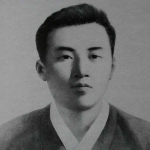
Kim Hyong-jik (10 July 1894 – 5 June 1926) was a Korean independence activist.
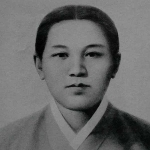
(21 April 1892 – 31 July 1932)
Kim Yong-ju (born 21 September 1920) is a North Korean politician and the younger brother of Kim Il-sung. He held key posts in the Workers' Party of Korea during the 1960s and early 1970s, but he fell out of favor in 1974 following a power struggle with Kim Jong-il.
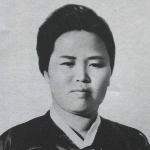
Kim Jong-suk (24 December 1917 – 22 September 1949) was a Korean anti-Japanese guerrilla, a Communist activist, North Korean leader Kim Il-sung's first wife.
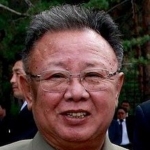
Kim Jong-il (16 February 1942 – 17 December 2011) was a North Korean politician who served as the second Supreme Leader of North Korea from 1994 to 2011.
(1944 – 1947)
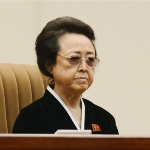
Kim Kyong-hui (born 30 May 1946) is the aunt of the current North Korean leader, Kim Jong-un. She currently serves as Secretary for Organization of the Workers' Party of Korea.
Kim Song-ae (29 December 1924 – September 2014) was a North Korean politician who was the First Lady of North Korea from 1963 to 1974.
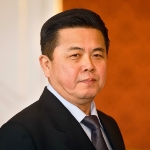
Kim Pyong-il (born 10 August 1954) is the only surviving son of the former leader and president of North Korea Kim Il-sung. He lived overseas between 1979 and 2019, and served in various diplomatic positions such as ambassador of North Korea to Hungary, Bulgaria, Finland, Poland, and the Czech Republic.
(born 1953)
(born 1955)
